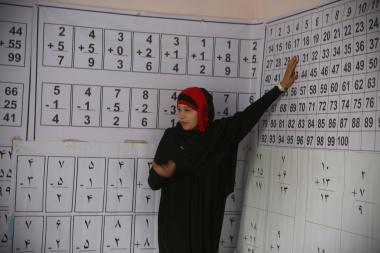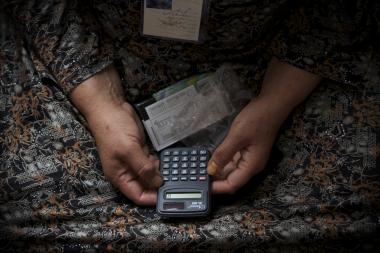At Women for Women International we use a lot of international development and women’s rights terms that often have a much deeper meaning and greater implications than a simple definition. In this series, we will be addressing some of these terms in the hopes of giving YOU the tools you need to have conversations about women’s empowerment and gender equality. In this blog, we’ll be discussing “numeracy”.
What is Numeracy?
Numeracy is the ability to count, read and write numbers, and apply basic mathematics in everyday life.
That was simple. Here is why numeracy matters:
Take for example, Sairi. She is over 60 years old and lives in the Kurdistan Region of Iraq. She recently participated in Women for Women International’s(WfWI) program held through our local partner, Free Yezidi Foundation. Before joining the program, she couldn’t recognize numbers. There she learned basic numeracy skills and noticed an immediate change in her life.
“When I go to the hospital I know numbers and letters now so I go myself, which makes me very happy. I can read which room I need to enter without asking for help,” Sairi says.
Sairi is not alone. Women we serve from Afghanistan to the Democratic Republic of the Congo talk about how learning numeracy made it possible for them to recognize different money bills, track their income, and be more efficient in many other ways. Women in Afghanistan, for example, tell us that the numeracy training has helped them recognize and record telephone numbers of their friends and family. They can be better connected with this new skill.
Why are women less likely to be numerate?
In much of the world, especially in poorer and conflict-affected regions where WfWI works, many are deprived of the chance to learn numeracy due to lack of educational opportunities. According to the United Nations, “children in conflict affected countries are more than twice as likely to be out of school compared with those in countries not affected by conflict.” To make matters worse, conflict has been proven to worsen existing gender disparities in education. Girls in conflicted-affected areas are “nearly 90% more likely to be out of secondary school than boys in countries not affected by conflict.”
This is due in large part to dangers that many girls and women face as a direct result of attending school in conflict settings. Attacks on girls’ schools in Pakistan and Afghanistan and Boko Haram’s kidnapping of school girls in Nigeria are only two examples of these threats. Other reasons may include lack of value placed on girls’ education, the threat of rape or other forms of violence against girls in schools, or child marriage. The absence of basic services such as lack of bathrooms and even sanitary napkins can also prevent girls from going to school. Around the world 130 million girls are out of school. Because girls are less likely to go to school, adult women are more likely to lack basic numeracy skills.
Numeracy touches all aspects of life. For many women, numeracy could mean more decision-making power at home, especially regarding household finances, and more control over their own income and savings. Without basic numeracy skills, women are more likely to be cheated out of their rightful income or credit. It is also hard, if not impossible, to do some everyday tasks, such as read a thermometer if your child is sick or help your child with their homework, if you are innumerate.
What is WfWI doing on numeracy?
Since WfWI specifically serves the most marginalized women in the areas that we operate in, many participants in our programs have little or no prior experience with numeracy. This is why we provide a numeracy training at the beginning of our 12-month social and economic empowerment program. However, women’s levels of numeracy vary greatly depending on the context, therefore the numeracy classes tailored to the specific needs of participants and optional for those who don’t need them. After a short series of approximately 10 classes, women we serve are able to apply basic multiple-digit addition and subtraction and improve their ability to use money. With these abilities, women can better understand and apply information throughout the economic empowerment training course, which includes business skills and financial literacy. Numeracy ultimately helps women earn an income, save money, and improve their own lives and the lives of their children and community overall.
Now that you know what numeracy is and why it is an important skill for women around the world, consider sponsoring a woman survivor of war to participate in our transformative program.


